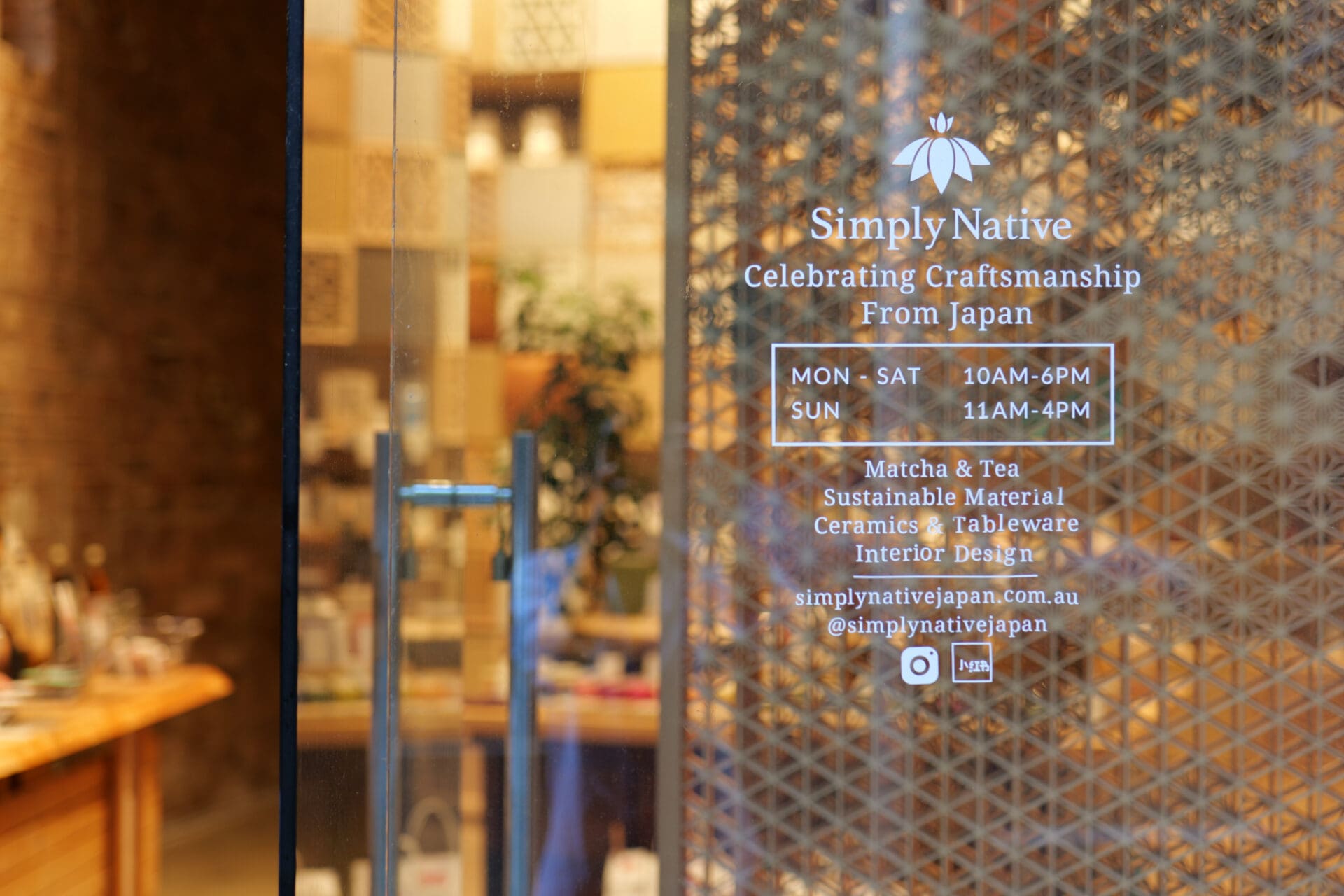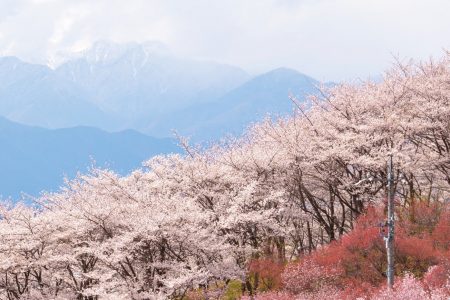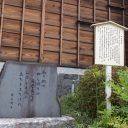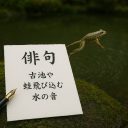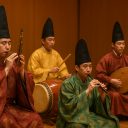
In this series, I asked Japanese businesswomen the stories behind their Sydney stores. Yukino Matsumoto, from Kagoshima Prefecture, is the owner of Simply Native, a beautiful artisan store nestled in Surry Hills.
(As an editor’s note, this interview was held in Japanese. )
Overflowing with special goods shipped from small-batch producers in Japan, Simply Native breathes a new life into craftsmanship and asks what it means to possess an uncompromising attitude.
“Australians like to tell and hear stories”

─Where did your journey of starting a business in Australia begin?
As a university student, I studied abroad in New Zealand and then lived in Melbourne for a year. At the time, it felt like there were next to no Japanese goods in Australia. On my return to Japan, there was a period where I was working to develop sales channels to the US and Europe, and on the whole, their markets didn’t seem very attractive to me. I felt like I wasn’t really treated fairly there. When I thought back to my old trips to Australia, people seemed to like new things, always asking questions, “What’s this?”. They liked to talk and to tell stories, and since we weren’t yet overflowing with Japanese goods, I thought it might be a good sales channel for new Japanese products from local industries, so that’s when I started.

─It seems to me that Simply Native focuses on, if I were to say it in English, “celebrating craftsmanship.” In addition to selling products, you hold a lot of workshops. How do you approach balancing the two?
In terms of delivering craftsmanship, I think of the people who make the products as human beings, and I hope that their personalities can be conveyed through our goods and services. When we do this, the value of the product is totally different from if the customer were to only look at the product. So, we do a lot of workshops as a place to understand that and to convey that background. For example, matcha workshops are very popular and there is a three to four month waiting list, but when I first came to Australia, there was no matcha of good quality available.
─There were those with milk powder premixed into the matcha,
Yes, or those with sugar in it,
─Much too sweet, right.
Exactly. I am a tea ceremony practitioner, but [in Australia] it is quite common to find matcha being sold that has turned yellow because it has not been stored properly, or customers are often told to use too much matcha and then complain that it is a bitter drink. As a tea practitioner, I find that hard to bear.
That’s why at Simply Native, we have created an original workshop where people can taste and compare different price points, food grades, and ceremonial grades, to show people why these products are so expensive and the differences between them. The workshops are an educational opportunity to share information.
─What Japanese products are particularly popular among Australian customers?
In terms of popular products, tea – green tea, and incense are popular right now. I think many of our customers are looking for spiritual stability, calmness, or spirituality through our products.
─I see. I wonder if it’s because customers are from the Surry Hills area.
(Laughs)
─How many years have you been practicing tea ceremony for?
I started learning tea ceremony in 2013, so it’s been about ten years in total. That being said, because of COVID I haven’t practised in a year and a half now, so I sometimes do it and sometimes don’t. I started it after I became a working adult because I wanted a hobby for the rest of my life.
─To that point, as well as having experience in practicing tea ceremony, I did see on your website that part of your experience was that your father was a kimono maker?
Yes.
“History is relevant to my work”

─Is it okay if we talk about that history?
Of course. I really think that this idea of history is relevant to my work. For example, because my family made kimonos and I grew up in an ‘artisan’ family, and I am in constant contact with artisans at my current job, I feel that I can understand what the artisans may find frustrating, or what I can do to make their lives easier. There is a special level of empathy there. Also, there may be this, what we might call ‘sympathy’ because I am the daughter of a kimono shop owner. I think there may also be a kind of preparation that we undertake to support craftspeople who haven’t sold products overseas before, and our communication makes it easier for people to feel comfortable doing business with us.
─You are uniquely able to ‘strengthen’ these relationships.
Yes, yes. I think so.
─Does your father still make kimonos?
By the time I was in primary school, he had stopped producing kimonos, and now he works in kimono repair. The repairing artisan is not able to successfully undertake a repair unless he knows the entire process, from the making of the material to the final weaving, so [in his area] there is no one else who can do it but him.
─This is especially true for kimono restoration. Kimono restoration is difficult.
Yes, that’s right. Especially, Oshima tsumugi, which my family used to make, is a woven kimono. It is even more difficult because it is not dyed. The pattern is expressed by weaving. Ah, here, here and here, these are all Oshima tsumugi (pointing at fabric hung up on the wall). If one thread breaks, the pattern changes.

─Did your father make these?
Yes, that’s right.
─They’re very beautiful. When you think about the future of Simply Native, do you have a dream or a message that you want to convey to your customers?
Yes, I do. It’s a bit difficult to say, but I think that Japanese craftsmanship and spirituality are attitudes that the world, including Australia, can learn from. At Simply Native, we have conceptualised this idea of craftsmanship, or of the craftsman, to mean the character of one who embodies the uncompromising pursuit of their ideal state, and equally finds enjoyment in the seasons and in their own lives. Who lives in harmony with the seasons and with nature. I value myself as someone who is endeavouring to pursue without compromise my ideal form, and I think that that attitude is something that we can learn, not only from people in the craft industry, but from those around us in our everyday lives. To that end, we will continue to do our part in making an effort to present ways which make it easier for people to embrace this philosophy.

─I think that’s wonderful. As a final theme, I’d like to ask you about the feminist perspective, or, shall I say, reflections on having hired only women in this shop.
Although it may seem natural that in choosing a team of talented, visionary people, it ended up being all women, it wasn’t intentional in that way. In the past, I’ve hired all sorts of people, so it’s not that I’ve made it a choice to hire only Japanese women.
─Maybe because I grew up in Australia, I think I’ve been instilled with a feminist mindset since I was a child-
I understand. Me too.
─Right so, I was particularly interested in asking Japanese businesswomen about this topic and their perspectives. When I asked Mika-San the same question, she surprisingly said no, it wasn’t a particular choice either. From my point of view, I thought that these points might be strong because as female-led businesses, I also saw that all the people working in this shop are women. I was told that although she definitely cares about these things, it was not a rule that she had decided on. That was a good learning experience for me.
I understand. A long time ago, I myself was interviewed for International Women’s Day, and I think the angle was specifically coming from the fact that it is quite difficult for young women to live in Japan. So, I was asked, “What’s your experience living in Australia?”. While I don’t particularly want to conduct a negative campaign against Japan either, when you put it all together, I think it is worth saying that Australia is really great because before questions of age, gender, or race, the priority is to ask, “What can you bring to the table?”. If I can communicate that I have a network of so many wonderful craftsmen, and that I can bring many great products, then there is recognisable value, and I think Australia is ahead of Japan in understanding this. In Japan, gender, age and where you’re from are the first filters, so there are ultimately more biases in Japan that fall outside your control.
─Before we finish, is there anything else you would like to say?
After doing this work, I find myself digging a little deeper and although I think the impression of Japan is good in Australia now, by participating in activities like this I hope that the next generation will find it easier to live in Australia. I think that it would be good to become more inclusive. I always think about how good it would be if the next generation could live here more easily.
─Yes, I have a feeling that it’s just the beginning.
We also believe that Japanese craftsmanship and spirituality are attitudes that the whole world could learn from, so although our store is limited to Japanese items, rather than some kind of passing fad, I wish for them to become commonplace among the general public. Most of the customers at this store are nor particularly Japanese-fans, they are regular people who are searching for special gifts and products. They might not have been to Japan before so, in a sense, it’s our goal to share this philosophy with them, and I think it would be great if it became more and more widespread.
I believe that there are still many great undiscovered qualities of Japan. It is very rewarding for us to be able to help people deliver and discover them through our mediation. I’m proud to have a place where I can present my culture and community in Surry Hills in Sydney.
You can find out further information, including workshop dates, at the link below.
Simply Native
Address: Shop 1/148 Goulburn St., Surry Hills, NSW, Australia 2010
Open: Monday to Saturday: 10AM-6PM, Sunday: 11AM-4PM
Web: https://simplynativejapan.com.au/
PROFILE
Sachi Kobayashi
As an intern at Nichigo Press, I was interested in producing a limited series exploring the perspectives of As an intern at Nichigo Press, I was interested in producing a limited series exploring the lived experiences of female professionals in Sydney. As a mixed-race writer navigating expression in my second language, I wanted to hear others express their perspectives and their stories freely in a way that I could not yet do myself.
Within a steep learning curve, the series gradually became a space where I honed my ability to ask sharper questions and engage more thoughtfully with their answers. In amidst this all, I came across several truly remarkable businesses. I remain grateful to the generosity of all the women who participated in this project.
All interviews were held entirely in Japanese, and I plan to publish them in both English and Japanese.
